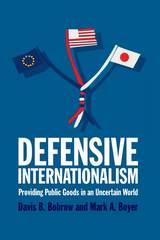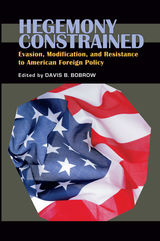
-Todd Sandler, Robert R. and Katheryn A. Dockson Professor of International Relations & Economics, University of Southern California
"Boyer and Bobrow's well-written, data-rich analysis of such pressing issues as development assistance, debt management, UN peacekeeping, and environmental protection makes Defensive Internationalism a highly original and provocative contribution to the study of global governance."
-Yale H. Ferguson, Co-Director, Center for Global Change and Governance, Rutgers University
In this pathbreaking study, authors Davis B. Bobrow and Mark A. Boyer argue for "muted optimism" about the future of international cooperation. Leaders of a growing movement that integrates constructivism into traditional international studies concepts and methods, Bobrow and Boyer analyze four key international issues: development cooperation, debt management, peacekeeping operations, and environmental affairs. Their approach integrates elements of public goods theory, identity theory, new institutionalism, and rational choice. Defensive Internationalism is a well-written, creative and coherent synthesis of ideas that have up to now been considered irreconcilable. It is appropriate for upper-level undergraduate and graduate students in international relations, conflict studies, and political economy, and promises to become a foundational work in its field.
Davis B. Bobrow is Professor of Public and International Affairs and Political Science at the University of Pittsburgh.
Mark A. Boyer is Professor of Political Science at the University of Connecticut.

An international group of contributors considers how and why a variety of foreigners act strategically to avoid, delay, or change American policy with respect to a broad range of issues in world affairs. Individual chapters analyze the Kurds and Shia in Iraq; the governments of China, Japan, Turkey, and Germany; the G-7; liberalizing the international economy; coping with global warming; regulating harmful tax competition; controlling missile proliferation; limiting public health damage from tobacco; and international public opinion bearing on the politics of responding to a hegemonic America.
By recognizing and illustrating moves that challenge American unilateralism, Hegemony Constrained provides a framework for understanding and anticipating the goals, motives, and means others in the world bring to their dealings with American hegemony in specific situations. Thus, it offers a corrective to naively optimistic unilateralism and naively optimistic multilateralism.
READERS
Browse our collection.
PUBLISHERS
See BiblioVault's publisher services.
STUDENT SERVICES
Files for college accessibility offices.
UChicago Accessibility Resources
home | accessibility | search | about | contact us
BiblioVault ® 2001 - 2024
The University of Chicago Press









